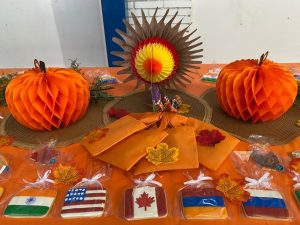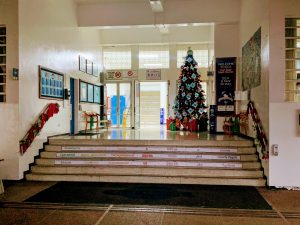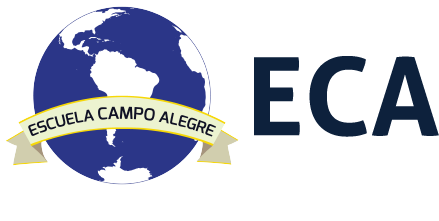ECA ANNUAL REPORT 2021-2022
Table of Contents
- Mission, Vision, and Guiding Statements
- Superintendent’s Annual Summary Report
- ECA Goals for 2021-2022
- MSA/CIS 2nd Year Report
- International Baccalaureate (IB) Diploma Authorization
- ECA Goals for 2022-2023
- Elementary Principal’s Report
- Elementary Counselor’s Report
- Middle School Dean’s Report
- High School Dean’s Report
- Secondary School Counselor’s Report
- Secondary School Counselor’s University Report
- Curriculum and Professional Learning
- Technology Report
- Library/Media Report
- Board Education Committee Report
- Board Finance Committee Report
- Board Human Resources Committee Report
ECA MISSION STATEMENT:
ECA is an inclusive learning community that encourages students to be compassionate, lifelong learners, responsible global citizens, and champions of their individual success.
ECA VISION STATEMENT:
ECA will empower students to strive for excellence through academic, personal, and social growth within a safe, trusting, and enduring environment in order to achieve their full potential.
Approved by the ECA Board of Directors June 13, 2019
GUIDING STATEMENTS:
ECA is an international Nursery to Grade 12 school. Until Grade 10 the school’s well-articulated curriculum taught in English, is based on the US Common Core standards. Students in grades 11 and 12, have the opportunity to fully participate in the IB Diploma Program or complete the ECA High School Diploma. ECA has a well established university and career guidance program.
ECA PROVIDES:
- An inclusive, safe, trusting and stable learning environment
- English and Spanish language support
- Adequate resources to sustain the school’s mission and vision
ECA is a learning community with a common mission focusing on collaboration and teamwork. Faculty and staff work together to achieve annual school-wide goals.
ECA is accredited by the Middle States Association (MSA) and the Council of International Schools (CIS)
TEACHING AND LEARNING AT ECA:
– Instructional strategies and teaching methodologies are centered around current best educational research-based practice.
– Inquiry-based learning activities are designed to be engaging, enjoyable, creative, authentic, innovative, collaborative, data-driven, and effectively utilize technology.
– Focuses on meeting individual student learning needs.
– Teachers professionally reflect on their own teaching practice in order to improve student learning, performance, and growth.
– Involves a regular review of curriculum, teaching instruction, assessment, and learning.
ECA STUDENTS:
– Are supported and encouraged to fulfill their academic, personal, social and emotional potential.
– Are encouraged to participate in artistic, athletic, multicultural and service learning activities
– Are resilient, leaders, risk takers and innovators.
– Are prepared for academic and non-academic experiences and for the challenges of becoming global citizens and completing university studies.
ECA develops ‘The Whole Person’, using Campo Way and IB Learner Profile Attributes, through:
- Acquiring the following skills: Reflection, analysis, critical thinking, creativity, communication, and collaboration
- Promoting high ethical standards
- Developing personal and social responsibility, self-confidence and emotional growth
- Realizing student self-potential and holistic development
- Promoting a positive “I can do/succeed growth mindset”
- Promoting respect for self and others
- Teaching students to make appropriate choices
- Fostering a commitment of service to help others
- Encouraging students to be industrious, honest and happy
Internationalism/Interculturalism/Global Citizens Involves:
- Understanding one’s own and other cultures through learning about language, diversity, society, culture, history, and arts promoting inclusion
- Promoting collaboration
- Encouraging learning about and understanding of global issues
- Promote helping others within and outside the ECA community
- Being respectful of diverse ideas and beliefs

SUPERINTENDENT’S ANNUAL SUMMARY REPORT – TERRY CHRISTIAN
“ECA is an inclusive learning community that encourages students to be compassionate, life long learners, responsible global citizens, and champions of their individual success.”
In August 2021 ECA was able to resume on campus learning after almost 2 academic years of online and hybrid learning. It was so good to see how happy students, faculty staff and parents were to be able to experience face to face learning again. As the first semester progressed we were able to hold modified community events and to slowly introduce after school activities again as well as on campus events with limited community attendance.
After the winter vacation, in January 2022, we experienced someclass closures due to an increase in Covid infections but by the end of February 2022 on campus school routines and after school activities were functioning again.
We returned to school after the Semana Santa break and were able to finish the school year without interruption as planned on June 9, 2022.
Events: The ECA yearbook “Beyond the Spectrum” visually shows academic, social community interactions and general school life. We were able to hold modified on campus events such as: Student Council (STUCO) movie nights, secondary Beach Bash, Halloween activities, Winter concert performances, elementary mini Olympics, middle school house activities, a middle school musical “Bone Soup”, Battle of the Books and other library activities, Kindness Squad activities, soccer, volleyball and tennis tournament, a Parent Association community evening, middle school Refugio activities, a week of Venezuela cultural and related activities, the IB Art Exhibition, an Earth Day Festival, Parent Association sponsored International lunches, service learning activities (clothing and food drive for ECA maintenance staff and volunteer visits to decorate a school garden in Petare) a National Symphony Orchestra Mother’s Day concert celebration, the graduation ceremony and end year presentations and celebrations.
Community Surveys: In October 2021 parent and student surveys were given to determine how the return to school and on campus learning and routines had functioned. In general the feedback showed that the majority of the community was satisfied although some parents wanted more opportunities to participate in on campus events. In May 2022 further surveys were administered with the outcome that the results showed that the vast majority of the ECA community strongly supported the school Mission and Vision. In addition parents expressed satisfaction with the quality of learning and interaction with faculty as well as being able to attend structured on campus events again.
The feedback from the May 2022 surveys will be used to further improve learning and school during the next academic year 2022-2023.
College Admissions: ECA continued with successful college admission placements with students being admitted to top colleges and universities in the United States of America (USA) and other countries. ECA graduates were once again accepted to one of their schools of choice. On average each senior had offers from at least 3 of their top university choices
Admissions and Enrollment: The Advancement Leader worked closely with the Elementary Principal, Middle and High School Deans and school counselors to arrange the admission interviews and assessments of new families and students. During this academic year ECA’s enrollment increased by 62% (from 152 to 246 students). In May admissions testing started for the academic year 2022-2023 with the expectation that enrollment could increase by a further 20 to 30%.
Eleven (11) Faculty Leaving ECA in June 2022
We have seven (7) overseas faculty members and four (4) local teachers leaving ECA this June. I thank the faculty for their excellent work and interaction with ECA students, and wish them success for the future.
New ECA Faculty August 2022
So far we have contracted nine (8) new overseas teachers and two (2) local teachers. We expect to hire one (1) more overseas teacher and two (2) local teachers as well as (2) two more teaching assistants to complete staffing for the academic year 2022-2023.
ECA Strategic Planning 2021-2023: During the academic year 2020-2021 the ECA Board of Directors, using an experienced team of consultants, began strategic planning for five main focus areas: Marketing, Admissions, Organizational Structure, Human Resources and After School Activities. Phase three (3) was completed in January 2022, It is intended that phase four (4), which will involve the ECA community as ambassadors and supporters, will be implemented during the next academic year.
New ECA Superintendent appointed effective July 2023: During September 2021 to April 2022 the ECA Board worked with international educational consultants Search Associates to identify well qualified and experienced candidates. During February to April 2022 community interviews were held with nine (9) shortlisted candidates. Jeff Richarson was offered and accepted the position.
Concluding Remarks: ECA’s COVID biosecurity protocols worked effectively throughout the school year. The community again showed customary flexibility, resilience and creativity as we continued to provide a safe, robust learning experience for students regardless of the circumstances occurring outside of the ECA campus. The continued dedication, motivation and professional work of ECA faculty and staff contributed to making what was an initially challenging year ultimately a successful one. On behalf of the ECA Board of Directors and ECA Faculty and staff, I thank the ECA parent community for their sustained support during this academic year.
I wish departing community members well with their new learning destinations. I congratulate the ECA graduating class of 2022 and wish them success with learning and their lives beyond the gates of ECA. I encourage ECA graduates to keep in touch with each other and with Escuela Campo Alegre!
I hope that all community members have safe vacations, stay safe, healthy and well, so that we can resume learning together again On Campus on Monday August 15, 2022.

ECA’s EDUCATIONAL GOALS FOR 2021-2022
Overarching School Wide Goal: Continued review and implementation of the accreditation recommendations as listed in the March 2020 Middle States Association (MSA) and the Council of International Schools (CIS) Visiting Team Report.
“ECA will also focus on the following four (4) school wide educational goals which provide further improvement with teaching and student learning and well-being:
- Review and update ECA’s curriculum ensuring vertical and horizontal alignment to ensure teaching and student learning continuity. (Completed → Ongoing)
- Ensure that students maximize the use of HATLs, organizational and study skills by providing explicit classroom instruction and authentic student learning experiences.(Completed → Ongoing)
- Continue to focus faculty and staff professional development activities so as to further support and improve differentiation and language learning.(Completed → Ongoing)
- Develop and promote a community well-being awareness program (Ongoing)
The ECA Board of Directors identified the following eight strategic objectives which ECA shall focus on until June 2023:
- Maintain, Develop and Improve the Quality of ECA’s International Education (Completed)
- Maintain, Develop and Improve Student Learning (Completed)
- Maintain/Increase Enrollment (Completed)
- Maintain and Develop a Like-Minded Supportive Community (Completed)
- Maintain Financial Independence and Provision for Emergency Situations (Completed)
- Keep Tuition Affordable (Completed)
- Continue to Collaborate and Interact with Other International Schools and Organizations (Completed)
- Maintain ECA’s International Accreditation Status (Completed)
During the academic year 2021-2022 ECA shall continue to focus on:
- Fostering positive relationships with international university admission offices so that ECA graduates are able to continue to successfully transition to higher learning destinations which best fit their learning needs. (Completed)
- Retaining and attracting the best qualified and committed international and local faculty. (Completed)
- Developing the school website and effectively using social media sources to promote ECA and enhance communication, public relations and marketing.(Completed)
Middle States Association (MSA) – Council of International Schools (CIS) Accreditation – Second Year Report – May 2022
Since May 2020 we have steadily worked with addressing the recommendations from the March 2020 MSA/CIS Visiting Team report. In May 2021 ECA’s action responses were sent to MSA/CIS and the annual report was accepted. On May 25, 2022 a follow up second year report was submitted to CIS with the following comment being received from CIS on May 30, 2022: “Thanks so much for sending along this thorough report of progress towards the recommendations from the accreditation team. It’s a great way to keep track of progress and to keep the community informed of all the work your school has done and continues to do in the process of ongoing school improvement and development.”
International Baccalaureate (IB) Diploma Authorization: During the past two academic years ECA was involved in completing and submitting the IB diploma self evaluation report. In March 2022 we received oficial authorization to continue offering the IB Diploma program at ECA.

ECA School Wide Goals 2022-2023
We used the MSA/CIS May 2022 second year report, as well as with information and feedback from other sources, to identify the following school-wide educational and professional learning goals for the academic year 2022-2023.
Overarching School Wide Goal: Continued review and implementation of the accreditation recommendations as listed in the March 2020 Middle States Association (MSA) and the Council of International Schools (CIS) Visiting Team Report.
ECA will also focus on the following three (3) school wide educational goals in order to provide continued improvement with teaching, student learning and well-being:
- Continue to review and update ECA’s curriculum ensuring vertical and horizontal alignment to ensure teaching and student learning continuity.
- Continue to ensure that students understand, internalize and maximize the use of HATLs, organizational and study skills by providing explicit classroom instruction and authentic student learning experiences.
- Further develop classroom pedagogy to incorporate differentiated instruction and implement inclusive teaching practices for all students.

ELEMENTARY PRINCIPAL’S REPORT – MICHELLE TILL
During the first semester the elementary school administration, working closely with the ECA Advancement Leader, was involved in many admission interviews and assessments of new families and students which led to a significant increase in student enrollment in the elementary school.
The elementary on-campus learning schedule was modified to allow for more efficient teacher planning and delivery which focused on providing more time to teaching the core subject areas, and supporting student academic, social and emotional learning needs.
Almost two years after the pandemic we began the year trying to return to “normal”. However we immediately found out that students’ needs-both academically as well as emotionally varied greatly. Students needed much time to reconnect with friends, practice and develop their lost social skills, get to know their teachers and readjust to the routines and rules of on-campus life again. Elementary teachers worked industriously to offer extra support and ensure that student social and emotional needs were taken care of and then, as the year progressed, worked with developing their academic needs.
In September on-campus Measures of Academic Progress (MAP) testing resumed for grades one to five. As the year progressed we were able to begin holding small community events such as red and white shirt Mini Olympics, publishing parties, the winter concert, community assembles and celebrations of student work, an elementary concert, a week of international lunches and the end of year transition events and presentations
Throughout the year elementary teachers worked closely with the Library and Technology teams developing professionally during weekly Teacher Action and Growth (TAG) sessions. These sessions focused on addressing the 4 school wide goals, differentiating teaching for student learning and developing organization skills by focusing on Habits and Attitudes Towards Learning (HATLs) and creating rubrics for assessments. In addition teachers were involved in Teachers Teaching Teachers (TTT) sessions, book clubs sharing and PLC discussion groups.
Planning and Preparations for the academic year 2022-2023: During April to June 2022 the elementary school administrative team, working closely with the ECA Advancement Leader, was involved in admission interviews and assessments of new families and students. In May 2022 a further revision of next year’s elementary on-campus learning schedule and curriculum was carried out to build upon the progress made during this academic year with the focus being on continuing to teach the core subject areas whilst supporting student academic, social and emotional learning needs.
ELEMENTARY COUNSELOR’S REPORT – MARIA ANDREA ECHENAGUCIA.
Students’ Health & Wellness: Every other week with each classroom, I structured a wellness class where we reinforced social skills, teamwork and respect towards each other. Every class has different needs and it is important to address them as such. In ECE, Nursery is all about sharing, following instructions and teaching them the CAMPO WAY. Pre-Kinder also is about following instructions, sharing and being respectful to others and teaching them the Campo Way. With the Whiteshirt students we reinforced the use of the Campo Way and worked to develop social skills, conflict resolution skills and being able to show empathy for others.
Parent Meetings: During the academic year I held meetings with individual parents to deal with specific school, parent and student concerns.
Admissions: During August 2021 to February 2022 I worked very closely with the Advancement Leader, the elementary principal and teachers to administer admissions testing. During May to June 2022 admissions testing for the next academic year occurred.

MIDDLE SCHOOL (MS) DEAN’S REPORT – JULIA BARANOWSKY
The ECA Middle School celebrated many successes during the 2021-2022 year, and there has been much effort and energy put into helping the students be positive contributors to the ECA community. This year, students were able to return to on-campus, face-to-face learning for the majority of the year. In the first semester, classes were held in the ECE building. In the second semester, classes were transitioned to the secondary area of the main building, in order to prepare for the next school year, to have more space for the students, and to have more teachers available for supervision and interaction with students.
Throughout the year MS teachers worked closely with the Library and Technology teams developing professionally during weekly Teacher Action and Growth (TAG) sessions. These sessions focused on addressing the 4 school wide goals, differentiating teaching for student learning and developing organization skills by focusing on Habits and Attitudes Towards Learning (HATLs) and creating rubrics for assessments. In addition teachers were involved in Teachers Teaching Teachers (TTT) sessions, book clubs sharing and PLC discussion groups.
In relation to School-wide Goal #4: “Develop and promote a community well-being awareness program: significant work occurred involving:
- Child Protection Policy sessions
- MS Advisory program – sessions that focus on character building and creating a positive learning environment
- One-on-one check-ins with MS teachers to offer support
- TAG/PD sessions focusing on faculty well-being
- Weekly check-ins with SS Counselor
- SS Counselor interacting with students and parents
In September on-campus Measures of Academic Progress (MAP) testing resumed for grades six to eight. Exploratory sessions for MS students were organized to give students exposure to 21st century learning concepts involving Technology, Health, Drama Music and Art.
Middle School Events and Activities
Restorative Student Practices: Regular sessions were held with the goal of having students involved in the process reflecting to understand the rationale related to consequences related to violations of school rules or expectations.
Mi Refugio: During March 14 to 18 counselors from “Mi Refugio” came to ECA and offered a week of experiential learning opportunities for the MS students.The activities were focused on team building and building trust. On the final day of the week MS parents participated.
MS STUCO: Students in STUCO met every Thursday morning and this year organized movie nights, spirit weeks and end of semester activities.
NJHS (National Junior Honor Society): NJHS students met every Wednesday, at lunch time, and hosted a secondary school information session supporting diabetes awareness month as well as fundraising to support the school’s maintenance staff.
Grade 5 → Grade 6 and 8 → 9 Transitions: Successful activities were held in May and June to give information to and help grade students and parents transition and understand expectations and operational procedures for the next grade level. Student orientation sessions and team building activities were held with MS student ambassadors supporting.
Planning for the academic year 2022-2023: In order to plan for the next school year, we used parent and student questionnaires to obtain feedback to inform and further develop and improve the Middle School program. Next year a Secondary School model will be adopted again, and a new Secondary School principal will be responsible for overseeing the academic program and daily operations in grades 6-12.


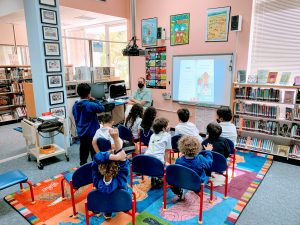
HIGH SCHOOL (HS) DEAN’S REPORT – CYNTHIA ABDALLAH
The High School had a fairly smooth transition to on-campus learning. The attendance and punctuality of students improved and we generally experienced a positive and vibrant learning environment this year. At the start of the year, we set five (5) HS goals and in this report, we will review the progress with the goals.
Goal 1: Strengthen the learning lab, advisory, clubs, and after school program for HS: The learning labs were adjusted with items that were not functioning being replaced by viable exciting and purposeful activities. On Mondays, high school students had assemblies and advisories in their classrooms involving important housekeeping announcements, and reminders, digital and media literacy, get-informed sessions, and IB learner profile assemblies. Mondays have been well utilized to promote the mission and vision of ECA.
Tuesdays were used mainly to strengthen and bridge gaps in various aspects of learning. With extra Mathematics and reading sessions, and current events, each quarter was focused on improving skill sets in all grade levels while providing grade 11 and 12 students a space for Higher Level support.
Thursdays were utilized by grade 9/10 students for counselor times and university visits. This has enabled our grade 9/10 students to work on developing their personal growth whilst focussing on early planning for college and university.
Fridays were set aside for clubs and STUCO led activities. The most popular club is the games which provides an outlet for energetic boys to experience various sports. Other successful clubs were National Art Honor society (NAHS), which collaborated on the Creating School murals and Earth day activities and the formation of the Green team, Grade 11 students led a Business club and a volleyball club. Other clubs included the debate club, technology club, history through film and the ecology club.
After School Sports: The most notable success was soccer which has seen us reintroduce participation and competition between ECA and other schools. Thanks to Mr. Pearce and Mr. St. Laurent for their dedication, commitment and hard work with this welcome initiative. A second semester four team weekend football tournament and the Avila cup with the British School were the main highlights. The Boys’ Basketball students also enjoyed a game with Colegio Internacional Caracas (CIC) and the Girls’ Volleyball team played against CIC.
Goals 2 and 3: Start the HS House system and introduce Olympic activities: High school students did not embrace the house system or the Olympic activities. This prompted us to introduce STUCO organized grade-level competitions which were successful. Such events included the traditional Beach Bash, dodgeball tournaments, capture the flag, jeopardy trivia, bingo, spirit weeks, valentines day activities and mini-games in the 5th floor gym, on the soccer field and in the gymnasium. It was very pleasing to see that the High School STUCO was able to create a vibrant program of activities.
Goal 4: Reinforce Discipline: High school discipline improved this year with most students positively observing school rules and behavioral expectations. We introduced a profanity policy and Mobile free Mondays to enhance our verbal and technology discipline and this has been understood and embraced by the students. In general HS students have shown positive social and emotional growth
Goal 5: Ensure that the Student Support Team and differentiation function effectively in the HS: Differentiation is an ongoing process that needs to be continually reinforced to improve learning outcomes. We have differentiated Mathematics classes, IB Higher and Standard level classes, and have created a support room for students who show academic or behavioral issues. The creation of the support room has enabled us to significantly eliminate behavioral issues. There are designated support teachers in the room every day and teachers can send students to the room for support using a green card system.
Faculty Professional Development: Throughout the year HS teachers worked closely with the Library and Technology teams developing professionally during weekly Teacher Action and Growth (TAG) sessions. These sessions focused on addressing the 4 school wide goals, differentiating teaching for student learning and developing organization skills by focusing on Habits and Attitudes Towards Learning (HATLs) and creating rubrics for assessments. In addition teachers were involved in Teachers Teaching Teachers (TTT) sessions, book clubs sharing and PLC discussion groups.
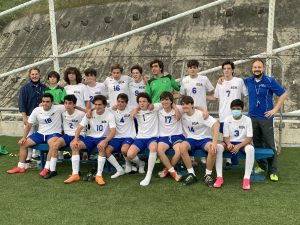
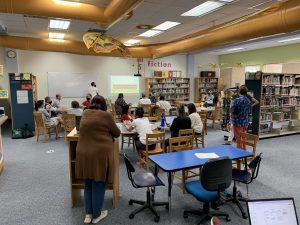
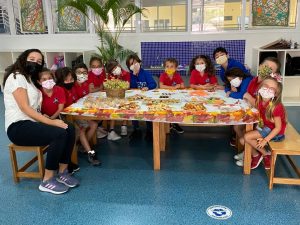
SECONDARY SCHOOL COUNSELOR’S REPORT – MARC ST LAURENT
Transition: It’s hard to believe that my first two year contract with ECA is expiring and a renewal will start up next year. Due to COVID and visa restrictions it has not been a smooth process but this year has helped me develop relationships with the community, gauge the norms of ECA and identify opportunities to help further the vision and mission of the school. In my role as Counselor, I’ve had the benefit to work with an experienced Leadership team that had targeted goals I was able to provide support for. Next year, I’ll be able to assist the transition of a new Secondary Principal as well as fulfilling the role of a Secondary Counselor.
Admissions Process: I’ve been a positive contributor to the Admissions process in helping to facilitate the process in the Secondary School. I’ve met with many potential families to discuss the ECA secondary school program and arranged for shadowing opportunities for potential students. There is no better way to showcase our school than to have them interact with our students and teachers in an authentic context. For new admissions cases, I review the academic records, interview the student and parents and then administer tests in Math, English and Spanish to determine whether this student would be an asset to our school and if we are able to meet their educational needs. To date, I’ve interviewed 20 students both for the Middle School and High School.
Educational Leadership Team (ELT): My involvement in the ELT continued with regular attendance in our weekly ELT meeting and planning sessions. We are often tasked with investigating a certain issue or situation and reporting back to the team to enable us to make sound educational decisions. I use the insights I’ve gained from interactions with students, parents, and teachers to help arrive at decisions that best support the functioning and practices here at ECA.
Student Support Services: In my role as Counselor, I’m directly responsible for ensuring our students receive the support they need to be successful in and out of the classroom. I organize periodic Kidtalk meetings, with secondary faculty, to determine which students are in need of support for their academic or social, emotional needs. We use the Wednesday TAG sessions to accomplish this and provide teachers with some time to discuss current trends in education and classroom and individual student support strategies. Differentiation and restorative practices were two specific areas we covered to help our faculty find and use appropriate remediation strategies with particular students. This year, I’ve worked with the Secondary Curriculum Coordinator and the Academic Deans to create a spreadsheet related to collating in one place all of the available academic data that we have to track our students’ progress. This data can be used to better serve students as well as leadership to make data driven decisions related to student support. ECA has hired an experienced secondary learning support specialist for next year. With this additional professional resource, we aim to further develop student support services in the secondary school.
Middle and High School Student Interaction: This middle school age range presents developmental challenges requiring solutions to support students and families. Peer relationships and identity are extremely important for middle school students. Counselors typically focus on these to help students mature.This year I met with many students in individual sessions as well as following up with their parents and the Middle School Dean. Each week I meet with the MS and HS Deans to discuss student concerns and develop plans for upcoming events. These sessions have been greatly beneficial for me with my work in best supporting the Deans and the students.
Soccer: Sports are an important part of school for many students. At ECA soccer is enjoyed by a large majority of the boys in both HS and MS. With Mr. Pearce I have developed the program we offer students and provide them opportunities to play after school and at lunch. In the MS, I take the students up to the field each day during their lunch break so they can play together. Each day approximately twenty students get involved playing in this unstructured setting and I’ve learned that this group is unable to manage themselves without adult intervention. They require constant adult attention to ensure participants are being considerate of each other. Conflict resolution skills are important with this age group and I spent considerable time engaging them in this process during the unstructured soccer time. MS students were also given time to have grade level games against each other and this proved to be an effective team building activity. It also provided plenty of opportunities to develop self-regulation, sportsmanship and camaraderie in the MS community.
I spent a considerable amount of time developing our HS soccer team. Mr. Pearce and I organized two practices a week where we were able to get a high percentage of the boys to participate. We started off with twenty four participants and this became one of the most popular activities at school. It signaled a turning point in the COVID situation and provided students the chance to gain a sense of normalcy in their lives again. We established friendly games with The British School of Caracas (TBSC), Colegio Internacional Caracas (CIC), and the French School. I organized a four team tournament in April and it was a pleasure to see our students coming out to support our team. I also coordinated a new best of five competition series, The Avila Cup, with The British School that has been ongoing all second semester. This tradition will continue each year and gives our student athletes an opportunity to support their school and showcase their talent through commitment, perseverance and camaraderie. My goal for next year is to further develop this sport at the school and would love to see a growing interest in some other sports especially offering some programs for our female athletes.
Skills for Success: During the second semester I piloted a new course that followed up on the class our Sophomores took last year in Grade 9. I wanted to be able to get an early start on the college process with these students by offering some career exploration and help students to start identifying possible majors they may want to pursue in university. We were able to expose students to the BridgeU platform earlier than previously done and helped to better appreciate all the functions on offer with this service. Students were able to start to explore the possible colleges they might be interested in and how to evaluate whether a school would be a good match for them. All our grade 10 students ( as well as Grade 11) took the PSAT in October so I was able to utilize time in this class to get them to understand their results and helped them get a head start on the SAT test prep available for free on Khan Academy. I also used this time to develop better study habits through exposure to various study techniques and the brain research that supports these approaches. We used the remaining time to organize a Career Fair and help them prepare for their end of the year exams.
Creativity, Action and Service (CAS) is a required part of the IB program and all our students in Grades 11 and 12 need to complete this course to graduate. IB Diploma students must satisfy the IB criteria set forth and our non-IB students need to complete the same standards. This year I served as the CAS coordinator and helped the Seniors finish off their CAS projects and completed the evaluation of their work. I was able to meet with the Juniors to help them set up their CAS projects and understand what is required from them. Hopefully, next year these students will be able to get out into the community more and engage in authentic learning experiences beyond the academic learning.
Advisory/Learning Labs: I’ve been one of the Grade 12 Advisors and meet with this group two times a week in the afternoon block. During this time our focus has been follow up on college applications and meeting IB and grade level graduation requirements. I’ve also worked with the Juniors during this time period to get started with their IB CAS projects and help them become familiar with building a college list, utilizing BridgeU and providing them with any matters related to their college search process. I also teach a weekly session with the Grade 9 and 10 and cover a variety of topics with a focus on academic and social emotional needs. I covered all aspects of the Wellness Wheel created by an organization called Healthy Minds and students were made aware of efforts they can make to maintain good mental health. We looked at conflict resolution, how to develop a growth mindset, the importance of physical health including sleep, diet and exercise.
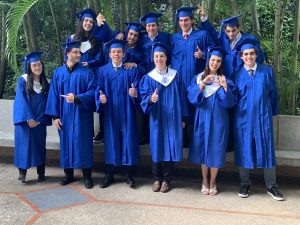
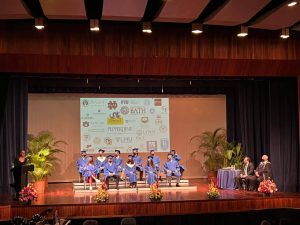
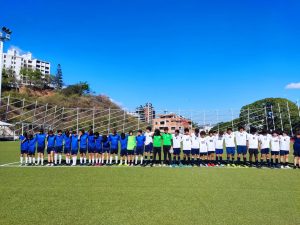
COLLEGE – UNIVERSITY REPORT – MARC ST LAURENT
College Virtual Visit: This semester I organized and ran virtual sessions with college admissions representatives serving higher educational institutions across Europe and the United States. With the majority of our students attending university in the USA, I arranged more presentations for this demographic. We had representatives from: Boston University, University of Tampa, Suffolk University, Florida International University, KEYSEducation and Leiden University.
College – University – Seniors – The Class of 2022: This year’s senior class had 11 students with the majority of them having been at ECA for several years. I individualized the college process to meet the varied needs of this group. Starting in late-September after they finished their Extended Essays, I organized small group and individual Saturday sessions to provide them with college list building, college applications and college essay workshops. Students applied to an average of ten schools and all our graduates were accepted into four year programs except for one student who will complete a gap year with the intention to apply for admissions the following school year. Seniors took advantage of the test optional trend now occurring at many American universities and only a few students took the SAT this year. It looks like next year many universities will remain test optional but if a student is able to obtain solid SAT scores, it will serve them well so I encourage students looking to apply to very competitive schools to look at taking the SAT. The Class of 2022 were successful in getting into their top school of choice.
College Acceptances Class of 2022 – 37 University Acceptances – 11 students
**Highlighted universities are schools where students have accepted their admissions offer.
Auburn University Suffolk University
Babson College Texas Southern University
Barry University The Culinary Institute of America
Bentley University The New School
Bryant University Tulane University
City University of London University of Bath
Drexel University UMASS Boston
Ecole Hôtelière Lausanne University of Arizona
Emmanuel College University of Boulder Colorado
Fisher College University of Denver
Full Sail University University of San Diego
Hult International Business School University Of San Francisco
Johnson and Wales University Villanova University
Lesley University
Loyola Marymount University
Lynn University
Northeastern University
Notre Dame University
Ohio State University
Pace University
Penn State University
Pepperdine University
Purdue University
Santa Clara University
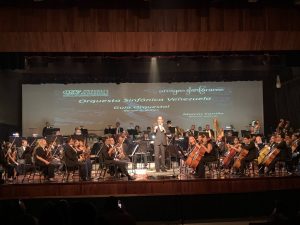
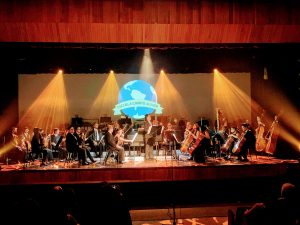
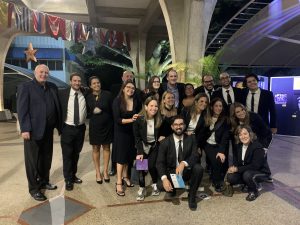
CURRICULUM AND PROFESSIONAL LEARNING
- Understanding By Design (UbD)
The two most important factors in ECA student learning are the richness of our curriculum and the quality of the teachers working in our classrooms with students. To ensure that the curriculum at ECA is relevant, engaging, aligned with our standards, and grounded in current research about how students learn best, a curriculum review action plan operates. Units of study are designed using the UbD process. This plan was designed to ensure that a clear scope and sequence in all subject areas (aligned to internationally recognized standards) is articulated and our units of study are designed “backwards” from our desired results.
This process involves faculty with learning about and implementing Teaching for Understanding and Understanding By Design (UbD) and writing, peer review, teaching, sharing and reflecting on units of study. We use an Integrated activity based learning approach as defined by and aligned with the Common Core. Curriculum development and writing is an ongoing process at ECA. ECA provides professional development to support teachers with lesson planning and implementation.
- Curriculum Documentation
ECA uses Google Drive to house curriculum documents, and a structure has been developed to ensure that ECA’s curriculum documents remain at ECA, in an organized and consistent structure, even after teachers and administrators leave. All ECA faculty and administrators accept that all curriculum materials developed and used at ECA remain here. All teachers have access to the ECA Curriculum Drive, and are expected to work within the grade level or departmental folders that have been established for them. Within these folders are three sub-folders where unit planners, assessment materials, and lesson plans and resources are stored. The Elementary Principal and the Secondary Curriculum coordinator meet with respective faculty during their Teacher Performance Appraisal System (TPAS) meetings to determine curriculum writing outcomes and ensure that the written and taught curriculum is being developed and documented, within the determined timelines, via the structures provided. The Elementary Principal and the Secondary Curriculum coordinator provide ongoing support for teachers with the curriculum documentation process so that the written curriculum evolves, and reflects what is actually taught in classrooms.
- Assessment and Reporting
Assessment is an ongoing process aimed at understanding, improving and informing student learning. Assessment involves making expectations explicit and public, setting appropriate criteria and standards, systematically gathering, analyzing and interpreting evidence to determine how well performance matches expectations and results, and using the resulting information to document, explain and improve performance. Assessment for and of learning are key parts of the UbD unit design process. Once desired results are determined, assessment tasks are designed (before the teaching and learning sequence) to allow students opportunities to demonstrate their understanding of and competency in the desired results.
In the Secondary School key features of the Assessment Policy are the separation of Habits and Attitudes towards Learning (HATLs) from the Achievement grade, grading on a 1-7 scale against criterion referenced rubrics, and a focus on student learning growth. Prohibited by the assessment policy are the use of percentages, giving zeros, having more than two assessment tasks per day, and assigning assessed work as homework. In the Secondary School, grading is criterion referenced, and on a 1-7 scale. Mid-semester and semester reports are each issued twice a year. Teachers issue grades four times per year for all students, and comments for all students at the end of each semester. Comments are also written for students who are underachieving on the mid-semester reports.
In the Elementary School students are assessed against our standards and performance is reported via a scale of 1-4 at the end of each semester. Informative comments are written as a part of each report.
The policies and practices of the assessment policy are commonly practiced across the school, and the Elementary Principal, the Secondary Curriculum coordinator, middle and high school Deans and curriculum representatives work with faculty to ensure that the assessment policy is appropriately and fairly implemented and communicated to students and parents.
Connected with the assessment policy is a school-wide Homework Policy. The ECA Homework policy sets appropriate limits and outlines the criteria for assigning meaningful homework designed to improve student learning. Homework does not count towards achievement grades.
- Teacher Action and Growth (TAG) and Professional Learning
Professional Learning at ECA is an ongoing developmental process and involves a structured balance of in-house shared activities/experiences (TAG) with participation at international online teacher training workshops.
In August 2021 TPAS requirements were revised to include a focus on the integration of differentiation in classroom observations and with instructional planning and now include a requirement where teachers document examples of how differentiation occurs in their teaching and student learning.
TAG time on Wednesday afternoons is dedicated to professional learning related to annual school-wide goals. In addition TAG time was used for Teachers Teaching Teachers (TTT) workshops, peer review of UbD units, curriculum articulation meetings, online courses, divisional/administrative tasks, curriculum work related to the MSA/CIS accreditation recommendations, annual follow up reports and program review related to the International Baccalaureate accreditation process. In May 2022 a TAG survey was conducted with ECA teachers to reflect upon and to take feedback about the TAG schedule and activities, and to help determine the best use of TAG time for the next academic year. School-wide goals for the next academic year are also determined and with these the leadership team uses faculty feedback and the responses to the recommendations from the MSA/CIS annual repors and the IB Diploma Program review to prepare a TAG calendar and a professional development plan for the next academic year.
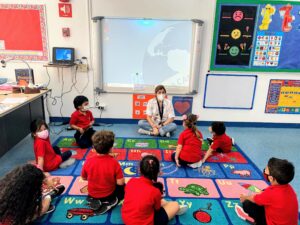
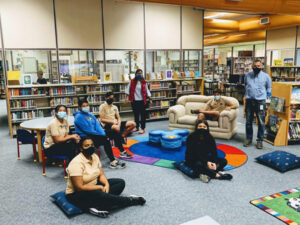
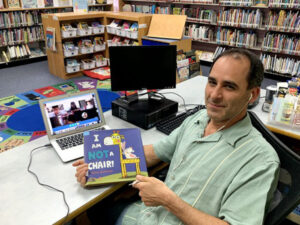
TECHNOLOGY REPORT
HEAD OF TECHNOLOGY – CHRISTIAN PROVIDENZIA
At ECA we leverage technology to:
- Improve overall academic performance
- Support on campus learning
- Support online/hybrid learning
- Increase student engagement and motivation
- Support teachers with planning, preparation, lesson delivery and professional development
- Expand community access to knowledge, research and learning resources
- Provide resource efficiency and cost savings
Our overall approach to technology integration is based on a Blended Learning model [1], research based, and guided by International Society for Technology in Education (ISTE) [2] and Common Core Standards [3].
We continue to develop the appropriate integration of Technology to improve and enhance teaching and student learning. ECA successfully operated robust on campus and online learning programs throughout the academic year.
We worked to provide support for faculty with their professional use of digital learning, use of assessment technology and professional development. We also worked to develop school technology platforms to function more effectively. We also worked to empower and provide increased technology independence of skills among faculty and administrative assistants in the elementary and secondary school offices. We continued to develop and share electronic information/learning tutorials for faculty, staff and students with a focus on encouraging the use of visual explanations for learning purposes.
To ensure a seamless classroom digital experience for students and faculty, we continued to work with the Superintendent and the Director of Support Services to protect and provide a high-quality internet experience for our students, faculty and community in the face of continued budgetary pressures. With our small but committed technology staff we have been able to continue to develop and improve the ECA technology user experience for students, staff and the community.
The Technology Integration Facilitator (TIF) assists faculty in both divisions to enhance teaching and learning through improved integration of technology. The TIF works with instructional faculty to integrate technology into their teaching. The TIF has also co-taught lessons that are planned together with teachers. The TIF effectively supported faculty and student learning, including ensuring efficiency so that, in emergency situations such as those experienced, in the past, we are able to transition to and support student learning online seamlessly.
This year we continued to have Digital Citizenship, digital video and photography activities, producing digital event publications/programs, a digital yearbook and significantly updating the school website to improve information access and the admission process. All these technology activities offered continue to provide enriching and interesting student learning experiences for students.
This year we also supported the MSA/CIS Self-Study 2nd year report and the IB diploma program review processes.
[1] https://www.teachthought.com/learning/12-types-of-blended-learning/
[2] https://www.iste.org/standards/for-students
[3] https://www.teachthought.com/pedagogy/exactly-what-the-common-core-standards-say-about-technology/

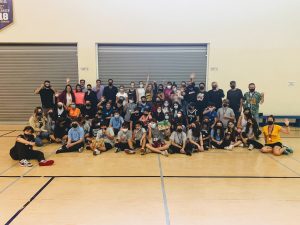
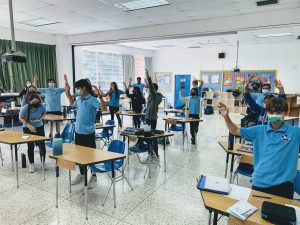
LIBRARY/MEDIA REPORT – ADAM SMEE
Overview: The academic year 2022 has proven to be an active one for the library. We have hosted a variety of classes, have consistent visits by both Elementary and Secondary school classes for book check out, expand the use of technology and integration with the Makerspace, and create a hub for the ECA community members.
TAG & Professional Development (PD) Policy Input Days – Faculty Training: TAG training continues to take place in the library meeting space. Along with the Curriculum Coordinator, the Library Director focused on professional development centered around the development of Reading & Writing Literacy by establishing grammatical norms across the K-12 spectrum. The third TAG cycle focused on the implementation of HATLs into our rubrics and scored assessments.
School Wide Goal 1: Review and update ECA’s curriculum ensuring vertical and horizontal alignment to ensure teaching and student learning continuity:
Evidence: ISTE Technology Standards and AASL Library Standards have been tracked according to grade level implementation.
School Wide Goal 2: Ensure that students maximize the use of HATLs, organizational and study skills by providing explicit classroom instruction and authentic student learning experiences
Evidence: Primarily completed during the TAG sessions, teachers have at least two (2) summative assessments that integrate HATL assessments on the unit templates. This is documented in each individual lesson/unit plan. Instructional strategies on how to do this have been well received by teachers and implemented across the board.
School Wide Goal 3: Continue to focus faculty and staff professional development activities so as to further support and improve differentiation and language learning.
Evidence: Used TAG and divisional meetings to provide professional development opportunities for ECA faculty to effectively access and utilize library resources.
The Library Director has facilitated numerous TAG sessions to support teacher learning and staff professional development. Along with the instruction for standards alignment (see School Wide Goal 1), the Library Director has also led sessions on Theory of Knowledge, Extended Essay, questioning strategies, and digital resource availability provided by the library.
More specifically, the Library Director continues to work closely with elementary teachers to incorporate reading strategies, increase understanding of young adult/children’s literature and non-fiction texts, and improve technology integration into their lessons. Similarly, educational videos for staff professional development included sessions for online tools, subscribed platforms, Makerspace and other library resources.
Small group sessions run by library staff assist classroom teachers in promoting/improving literacy. Particularly in MS and upper ES, the students will have groups of 5-6, personal attention for reading differentiated materials, and individualized attention.
School Wide Goal 4: Develop and promote a community well-being awareness program.
Evidence: The Library Staff have supported all Health and Wellness initiatives.
Additional Statement: Community Access to the Library:
Evidence: Community access to the library continues to grow. Parents have expressed interest in checking out books, though this is a definite area of focus if we are to improve literacy with the students. Some parents are using the library as a place to work. Although the Parent Literacy group faltered at the end, parents did express interest in continuing in the upcoming school year. This is a positive sign that demonstrates parent interest. We had a few events for fourth grade and sixth grade where parents were invited to participate as a public to watch their children. This was successful and showed high numbers. More types of these events will be promoted.
Finally, the library has played an integral role in documenting community happenings by taking pictures for the Instagram account, website, and yearbook. These are shared throughout the school and social media for the Advancement Leader’s admissions work. In addition, the library staff has worked to make the library a more interactive place, including games in the windows (Boggle, Trivia, and other attractions). This has been immensely helpful for attracting people and visitors to the library.
A main achievement this year has been the improvement of the ECA Library website, which provides online access to school materials, search engines and paid subscriptions. Though structured and strategic reductions have been made to the number of digital platforms the school pays for, a great variety is still available for both the elementary and secondary divisions.
-Grades 1-5 have weekly lessons (online and in person) with the Library Director.
-The Library Director created a series of educational/tutorial videos for staff professional development as well as for students.
-A weekly Drop Everything and Read (DEAR) session also occurs with grades 9/10 (online and in person).
-Book pick-up/drop-off has been streamlined with the security guards so that drivers and parents are able to communicate with the library for this service. Overall, this has been successful and efficient.
The Library Director has taken an active role in the promotion of the school by contributing to online publications and publicity. These include the digital yearbook, photos for the website, and brochures for advertising.
Teaching duties include high school Theory of Knowledge (ToK), which uses the library as a classroom, and Graphic Design, which uses the ECA studio/tech laboratory. Because of the nature of these courses, students have greater exposure to and participation in the library.
ECA EDUCATION COMMITTEE REPORT
